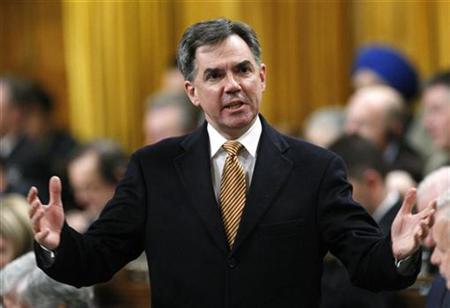Biggest Polluters Closer To Climate Deal: Canada
Author: Peter Griffiths

Canada's Environment Minister Jim Prentice speaks during
Question Period in the House of Commons on Parliament Hill in Ottawa
February 26, 2009.
Photo: Chris Wattie
LONDON - The world's biggest greenhouse gas producers have edged closer to agreement on a deal to fight global warming at crucial climate change talks in December, Canada's Environment Minister Jim Prentice said on Thursday.
Talks between the biggest economies, hosted last month by President Barack Obama in Washington, had helped to bridge gaps between countries ahead of the U.N. meeting in Copenhagen to find a successor to the Kyoto Protocol, he added.
"I am quite hopeful, optimistic about the prospects of reaching an agreement," Prentice told Reuters. "My sense is there is a consensus amongst the G8 countries that we need to have specific targets in place.
"I was not always so optimistic, but the convenement of the Major Economies Forum (on Energy and Climate) by President Obama causes me to have considerable confidence."
However, he warned there was "much work to be done" before any agreement can be reached on a pact to replace Kyoto, which limits climate-warming greenhouse emissions and expires in 2012.
Although G8 member Canada signed up to Kyoto, Prime Minister Stephen Harper abandoned it soon after he came to power in 2006. He said the country's emissions had risen since it signed the treaty and the cuts now required would hurt the economy.
Canada's greenhouse gas emissions were 25.3 percent above the 1990 level in 2005, far above its Kyoto target of a 6 percent cut below 1990 levels by 2008-12.
Setting binding targets in Copenhagen would not be the most important goal of the talks, Prentice added.
"What is essential about reaching an agreement in Copenhagen is to have the United States as a full partner in the battle against climate change," he said. "The question of target levels is important, but I think it is less important than having the United States as a fulsome partner."
As well as a shared border, Canada and the United States have close energy links. Canada is the largest single supplier of energy to the United States, accounting for about 9 percent of U.S. oil consumption and 15 percent of its natural gas.
Extracting the heavy crude from Canada's oil sands produces huge amounts of the greenhouse gases blamed for global warming.
Measures to help the environment must be balanced with steps to help the economy during the global recession, Prentice added.
"I have never seen that as a zero sum game where to advance your environmental objectives you do so at the detriment of your economy," he said. "You have to have a certain amount of prosperity to drive environmental progress."
Canada aims to boost its economy by investing in "green" technology, such as carbon capture and storage, which traps carbon dioxide (CO2) emissions from coal-fired power stations and buries them underground, he added.
"This is really a technology where Canada has led the way," he said.
© Thomson Reuters 2009 All rights reserved
